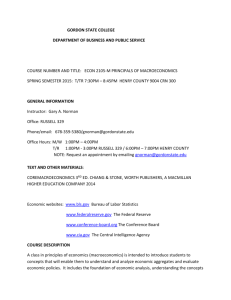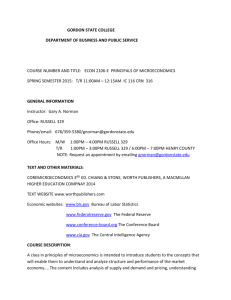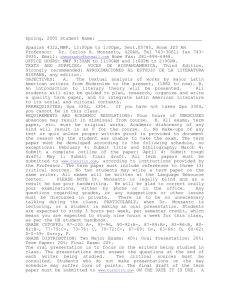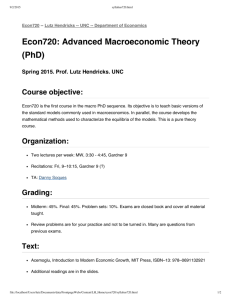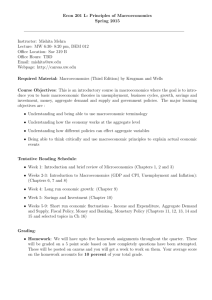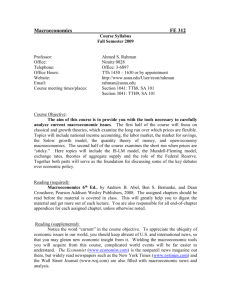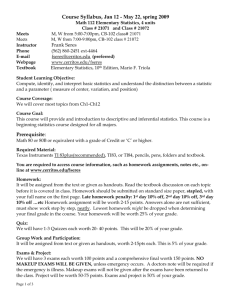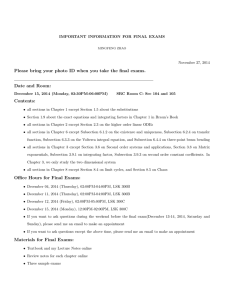syllabus crn 308 - Gordon State College
advertisement
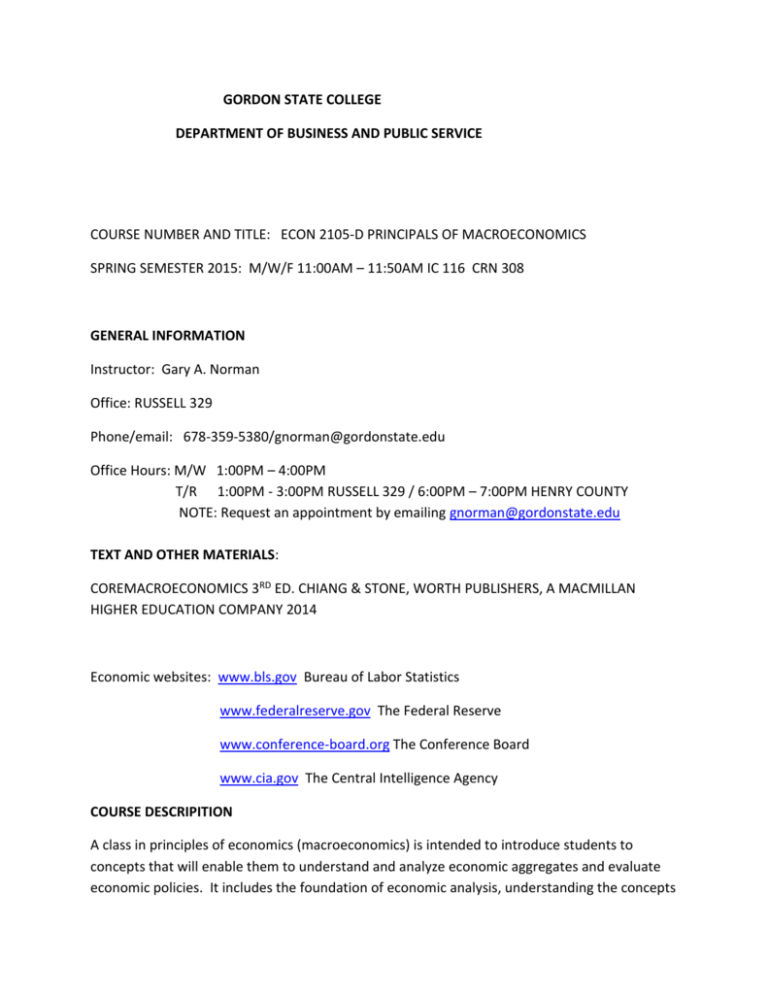
GORDON STATE COLLEGE DEPARTMENT OF BUSINESS AND PUBLIC SERVICE COURSE NUMBER AND TITLE: ECON 2105-D PRINCIPALS OF MACROECONOMICS SPRING SEMESTER 2015: M/W/F 11:00AM – 11:50AM IC 116 CRN 308 GENERAL INFORMATION Instructor: Gary A. Norman Office: RUSSELL 329 Phone/email: 678-359-5380/gnorman@gordonstate.edu Office Hours: M/W 1:00PM – 4:00PM T/R 1:00PM - 3:00PM RUSSELL 329 / 6:00PM – 7:00PM HENRY COUNTY NOTE: Request an appointment by emailing gnorman@gordonstate.edu TEXT AND OTHER MATERIALS: COREMACROECONOMICS 3RD ED. CHIANG & STONE, WORTH PUBLISHERS, A MACMILLAN HIGHER EDUCATION COMPANY 2014 Economic websites: www.bls.gov Bureau of Labor Statistics www.federalreserve.gov The Federal Reserve www.conference-board.org The Conference Board www.cia.gov The Central Intelligence Agency COURSE DESCRIPITION A class in principles of economics (macroeconomics) is intended to introduce students to concepts that will enable them to understand and analyze economic aggregates and evaluate economic policies. It includes the foundation of economic analysis, understanding the concepts of demand and supply and price determination, money and credit systems, determining the level of aggregate macroeconomic activity, the impact of globalization on macroeconomic activity, and identification of underlying social goals. COURSE OBJECTIVES: The specific educational goals of this course are: a. To provide an introduction to the forces of supply and demand and their relationship to price. b. To present the basic macroeconomic concepts of market theory, economic models, and money and banking. c. To develop and understand of the reasoning behind government policy decisions concerning inflation and unemployment. d. To increase the student’s awareness and understanding of the United States economic system and to evaluate the merits of comparative economic systems. e. To assess the international market place and the role of trade in the global marketplace. METHOD OF INSTRUCTION: This is a lecturer centered course. Lecture PowerPoint slides provided by the text will be used to assist in explaining key points., In addition, the relevant economic websites listed above will be used extensively. EVALUATION METHODS: Your final grade will be determined by your performance on exams (3), a writing project, class participation and a final exam. Other variables such as attendance, completion of reading assignments, and interest will be considered in a final determination of grades. Exams/ 3 = 30% Writing Project = 20% Class Participation = 20% Final Exam = 30% = 100% Students are required to track attendance and grades received during the term. A log is provided for this purpose on my website and will be explained the first day of class. Excessive absences (over 5) and late to class will result in a grade of C or lower on class participation. A strategy for success is provided and can be found on my website. Following the strategy will also be considered as a factor in determining class participation scores. No make-up exams will be given unless the student has received permission to make up the exam prior to the scheduled date. Students are required to provide a scantron for exams. The project will be explained the first day of class. Also, notes are posted on my website. COURSE CALENDAR: WEEK OF: A strategy for reading, reviewing and preparing for exams is provided on my website. It is required that students read/study the chapters scheduled prior to the first lecture. And, I have prepared chapter review materials and posted on my website by chapter and is to be completed by the final class period of the week. January 5th/week 1 - Course Introduction January 12th/week 2 - Chapter 1: Exploring Economics & Chapter 2: Production, Economic Growth, and Trade January 19th/week 3 - Monday MLK Day – No Classes Chapter 3: Supply and Demand January 26th/week 4 - Chapter 4: Markets and Government Exam #1 Friday 30th February 2nd/week 5 - Chapter 5: Introduction to Macroeconomics February 9th/week 6 - Chapter 6: Measuring Inflation and Unemployment February 16th/week 7 - Chapter 7: Economic Growth February 23rd/week 8 - Chapter 8: Aggregate Expenditures March 2nd/week 9 - Chapter 9: Aggregate Demand and Supply Exam #2 Friday 6th March 9th/week 10 - Spring Break March 16th/week 11 - Chapter 10: Fiscal Policy and Debt March 23rd/week 12 - Chapter 11: Savings, Investment, and the Financial System April 6th/ week 13 - Chapter 12: Money Creation and the Federal Reserve April 13th/week 14 - Chapter 13: Monetary Policy Exam #3 Friday 18th April 20th/week 15 - Chapter 14: Macroeconomic Policy, Chapter 15: International Trade April 27th/week 16 - Last Day of Class Wednesday/Final Exam Reviews May 1st – 6th Final Exams NOTE: SUBJECT TO CHANGE AS CIRCUMSTANCES MIGHT REQUIRE STUDENTS WITH DISABILITIES Student with a disability that requires assistance or class accommodations or any accommodations for testing should contact the Office of Counseling Services. ADA Services if needed must go through the process of receiving approved accommodations through the Student Counseling and Disability Services Office, Student Center, Room 212, phone 678/3595585.
